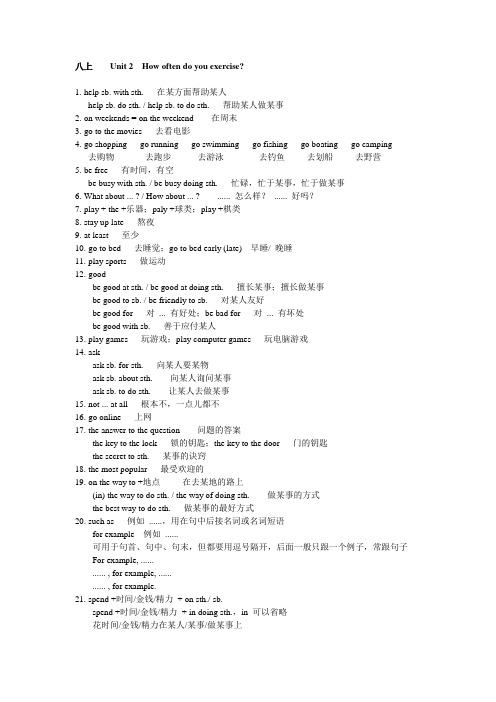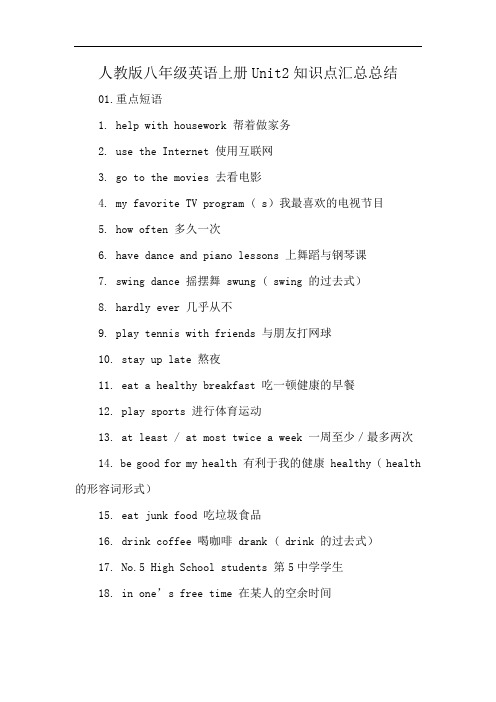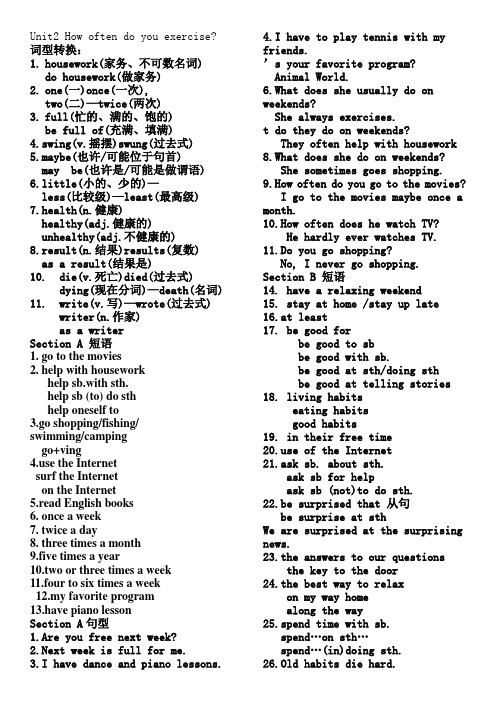初中英语 人教版八年级上册第二单元知识点
人教版初中英语八年级上册Unit2知识点总结

八上Unit 2 How often do you exercise?1.help sb. with sth. 在某方面帮助某人help sb. do sth. / help sb. to do sth. 帮助某人做某事2.on weekends = on the weekend 在周末3.go to the movies 去看电影4.go shopping go running go swimming go fishing go boating go camping去购物去跑步去游泳去钓鱼去划船去野营5.be free 有时间,有空be busy with sth. / be busy doing sth. 忙碌,忙于某事,忙于做某事6.What about ... ? / How about ... ? ...... 怎么样?...... 好吗?7.play + the +乐器;paly +球类;play +棋类8.stay up late 熬夜9.at least 至少10.go to bed 去睡觉;go to bed early (late) 早睡/ 晚睡11.play sports 做运动12.goodbe good at sth. / be good at doing sth. 擅长某事;擅长做某事be good to sb. / be friendly to sb. 对某人友好be good for 对... 有好处;be bad for 对... 有坏处be good with sb. 善于应付某人13.play games 玩游戏;play computer games 玩电脑游戏14.askask sb. for sth. 向某人要某物ask sb. about sth. 向某人询问某事ask sb. to do sth. 让某人去做某事15.not ... at all 根本不,一点儿都不16.go online 上网17.the answer to the question 问题的答案the key to the lock 锁的钥匙;the key to the door 门的钥匙the secret to sth. 某事的诀窍18.the most popular 最受欢迎的19.on the way to +地点在去某地的路上(in) the way to do sth. / the way of doing sth. 做某事的方式the best way to do sth. 做某事的最好方式20.such as 例如......,用在句中后接名词或名词短语for example 例如 ......可用于句首、句中、句末,但都要用逗号隔开,后面一般只跟一个例子,常跟句子For example, ............ , for example, ............ , for example.21.spend +时间/金钱/精力+ on sth./ sb.spend +时间/金钱/精力+ in doing sth.,in 可以省略花时间/金钱/精力在某人/某事/做某事上22.go to the dentist 去看牙医23.a lot of = lots of 许多,大量,后接不可数名词或可数名词的复数形式24.more than 多于;less than 少于25.most of the time 大多数时间26.how often 多久一次,询问频率how long 多长,询问物体长度或时间长短how far 多远,询问距离how many 多少个,询问数量,只能接可数名词的复数形式how much 多少个,询问数量,只能跟不可数名词多少钱,询问价格,可数名词、不可数名词都可以27.how often 提问频率*具体次数,答语可以用once, twice, three times ......once, twice 一次,两次,是固定用词三次以及三次以上,用基数词+ times,例如:three times ...... fifteen times ...... 100 times ......once a week 每周一次twice a month 每月两次four times a year 一年四次*笼统地说,用频度副词,有always usually often sometimes seldom hardly ever never 总是通常经常有时很少几乎不从不频度副词在句中的位置实义动词的前面I often go to school by bike.be动词/情态动词的后面He is always busy on weekends.We can never see him again.28.It is + adj. + (for sb.) to do sth.对于某人来说,做某事是怎样的It is hard for me to learn English.It is + n. + (for sb.) to do sth.对于某人来说,做某事是 ...It is a good habit to eat healthy food.注意:两个句式中,it都作为形式主语,不翻译否定句中,not放在be动词的后面It is not hard to learn English.It is not a good habit to eat junk food.。
人教版八年级上册第二单元英语知识点

人教版八年级上册第二单元英语知识点Unit 2 How often do you exercise?短语help sb with sth 帮助某人做某事2. hardly ever几乎从不3.go shopping去买东西4. on weekends在周末5.once a week一星期一次6. twice a month一个月两次7. go to the movies去看电影8. every day每天9.how often多久一次10.Animal World动物世界e the Internet上网12.be free=be not busy=have time 有空13.have dance and piano lessons上舞蹈和钢琴课14.swing dance摇摆舞15.play tennis打乒乓球16.stay up late熬夜到很晚17.go to bed去睡觉18.eat a healthy breakfast吃一顿健康的早餐19.at least至少,不少于,起码20.go to bed early早睡觉21.play sports做运动22.be good for对….有好处23.be good at doing sth擅长做某事24.junk food垃圾食品25.go camping去野营26.in one’s free time在某人的业余时间里27.ask sb. about sth.向某人询问某事28.not ...at all一点也不29.for fun为了娱乐30.the answers to the questions问题的答案31. by doing....通过...32.最受欢迎的the most popular33.the best way to do sth.做某事的最好方式34.such as例如….像….这样35.spend time with sb.和某人一起度过36.old habits lie hard旧习难改37.more than多于38.less than少于39.go to the dentist看牙科医生词语辨析:1.go to bed强调“上床睡觉”的动作及过程,但人不一定睡着。
人教版八年级英语上册Unit2知识点汇总总结

人教版八年级英语上册Unit2知识点汇总总结01.重点短语1. help with housework 帮着做家务2. use the Internet 使用互联网3. go to the movies 去看电影4. my favorite TV program ( s)我最喜欢的电视节目5. how often 多久一次6. have dance and piano lessons 上舞蹈与钢琴课7. swing dance 摇摆舞 swung ( swing 的过去式)8. hardly ever 几乎从不9. play tennis with friends 与朋友打网球10. stay up late 熬夜11. eat a healthy breakfast 吃一顿健康的早餐12. play sports 进行体育运动13. at least / at most twice a week 一周至少/最多两次14. be good for my health 有利于我的健康 healthy ( health 的形容词形式)15. eat junk food 吃垃圾食品16. drink coffee 喝咖啡 drank ( drink 的过去式)17. No.5 High School students 第5中学学生18. in one’s free time 在某人的空余时间19. ask them about their free time activities 询问他们关于他们的业余活动20. not … at all 根本不…21. go online 上网22. be surprised that ..感到惊讶23. use it for fun 为了取乐而使用它24. the answers to the questions 这些问题的答案25. one to three times a week 一周一到三次26. two percent of the students 2%的学生27. the best way to do sth.做某事的最好方式28. such as 例如29. spend time with your friends 与你的朋友共度时光spent ( spend 的过去式)30. spend time on sth./ in doing sth.花时间在某事上/做某事31. play together 一起玩32. watch TV for over 2 hours 看两个多小时电视33. go to the dentist 去看牙医34. a 16-year-old high school student 一名16岁的中学生35. have a lot of good habits 有许多好习惯36. more / less than two hours 多/少于两小时37. go to the dentist for teeth cleaning 去牙医处清洁牙齿38. go to the shopping center 去购物中心02.重点句子语法聚焦1. --What do you usually do on weekends?你在周末通常做什么?--I always exercise.我总是锻炼。
八年级上册英语人教版第二单元笔记

八年级上册英语人教版第二单元笔记一、重点单词。
1. housework.- 不可数名词,意为“家务劳动;家务事”。
例如:I often help my mother with the housework.(我经常帮助我妈妈做家务。
)2. hardly.- 副词,意为“几乎不;几乎没有”,本身具有否定意义。
例如:He can hardly speak English.(他几乎不会说英语。
)3. ever.- 副词,意为“在任何时候;从来;曾经”。
例如:Have you ever been to Beijing?(你曾经去过北京吗?)4. once.- 副词,意为“一次;曾经”。
作“一次”讲时,可用于表示频率。
例如:I go to the movies once a week.(我每周去看一次电影。
)5. twice.- 副词,意为“两次;两倍”。
例如:I have read this book twice.(我已经读过这本书两次了。
)6. Internet.- 名词,意为“(国际)互联网;因特网”。
例如:We can get a lot of information on the Internet.(我们能在互联网上得到很多信息。
)7. program.8. full.- 形容词,意为“忙的;满的;充满的”。
be full of = be filled with,意为“充满……”。
例如:The glass is full of water.(杯子里装满了水。
)9. maybe.- 副词,意为“大概;或许;可能”,通常放在句首。
例如:Maybe he is at home.(也许他在家。
)10. swing.- 名词,意为“摆动;秋千”;作动词时,意为“(使)摆动;摇摆”。
例如:There is a swing in the park.(公园里有一个秋千。
)The monkey is swinging from tree to tree.(猴子在树间荡来荡去。
Unit2知识点人教版八年级英语上册

Unit2 How often do you exercise? 词型转换:1.housework(家务、不可数名词)do housework(做家务)2.one(一)once(一次),two(二)—twice(两次)3.full(忙的、满的、饱的)be full of(充满、填满)4.swing(v.摇摆)swung(过去式)5.maybe(也许/可能位于句首)may be(也许是/可能是做谓语) 6.little(小的、少的)—less(比较级)—least(最高级)7.health(n.健康)healthy(adj.健康的)unhealthy(adj.不健康的)8.result(n.结果)results(复数)as a result(结果是)10. die(v.死亡)died(过去式)dying(现在分词)—death(名词) 11. write(v.写)—wrote(过去式)writer(n.作家)as a writerSection A 短语1. go to the movies2. help with houseworkhelp sb.with sth.help sb (to) do sthhelp oneself to3.go shopping/fishing/swimming/campinggo+vinge the Internetsurf the Interneton the Internet5.read English books6. once a week7. twice a day8. three times a month9.five times a year10.two or three times a week11.four to six times a week12.my favorite program13.have piano lessonSection A句型1.Are you free next week?2.Next week is full for me.3.I have dance and piano lessons.4.I have to play tennis with my friends.’s your favorite program?Animal World.6.What does she usually do on weekends?She always exercises.t do they do on weekends?They often help with housework 8.What does she do on weekends?She sometimes goes shopping.9.How often do you go to the movies?I go to the movies maybe once a month.10.How often does he watch TV?He hardly ever watches TV. 11.Do you go shopping?No, I never go shopping.Section B 短语14. have a relaxing weekend15. stay at home /stay up late16.at least17. be good forbe good to sbbe good with sb. be good at sth/doing sthbe good at telling stories 18. living habitseating habitsgood habits19. in their free timee of the Internet21.ask sb. about sth.ask sb for helpask sb (not)to do sth.22.be surprised that 从句be surprise at sthWe are surprised at the surprising news.23.the answers to our questionsthe key to the door24.the best way to relaxon my way homealong the way25.spend time with sb.spend…on sth…spend…(in)doing sth.26.Old habits die hard.27.a 16yearold high school student an 8yearold boy28.more than =over29.go to the dentist=see a dentist30.less than 6 hours31.go online32.as a resultthe result of…… at allTwenty percent do not exercise at all.34.eat a healthy breakfast35.be full for sb.be full of= be filled with36.want sb. (not) to do sth.37.by doing sth.38.such as + n./pron./ving.39.be in good health= be/keep/stay healthySection B 句型1.We asked our students about their free time activities.2.Here are the results.3.We found out that only fifiteen percent of our students exercise every day.4.And twenty percent do not exercise at all.5. We all surprised that ninety percent of them use the Internet every day6.The answers to the questions about watching TV were also interesting.7. Although many students like to watch sports, game shows are the most popular.’s good to relax by using the Internet or watching game shows9.But we think the best way to relax is through exercise.10.You can spend time with your friends and family as you play together.作文1:How to keep healthy Health is very important. Are you healthy? Do you want to know how I keep healthy? At school, I do morning exercises and eye exercises. I try to do some running. I think It's good to relax by exercising. At home ,I clean my room and wash my clothes. I usually get up early and never stay up late. My eating habits are pretty healthy.I eat lots of fruit and vegetables.I drink milk every day. I never eat junk food or drink coffee. They are unhealthy.I'm sure if we do like that, we can keep healthy easily.作文2:Hello,I am Nancy.Let me tell you something about myself.I have a healthy lifestyle. I go to bed early and get up early every day.I never stay up late. I eat lots of vegetables and fruit and never eat junk food. I'm very healthy. I exercise at least three times a week and keep walking to school every day.At school,I study hard and listen to the teachers carefully in class. After school I always finish my homework on time. In my spare time,I often read books and sometimes I surf the Internet.I think that my healthy lifestyle helps me get good grades.。
人教版八年级英语上册第二单元必背课文、单词、重点短语与语法梳理汇总

八年级英语上册第二单元必背课文、单词、重点短语与语法梳理汇总一、必背课文2b 文章部分《What Do No. 5 High School Students Do in Their Free Time?》Last month we asked our students about their free time activities. Our questions were about exercise, use of the Internet and watching TV. Here are the results.We found that only fifteen percent of our students exercise every day. Forty -five percent exercise four to six times a week. Twenty percent exercise only one to three times a week. And twenty percent do not exercise at all!We all know that many students often go online, but we were surprised that ninety percent of them use the Internet every day. The other ten percent use it at least three or four times a week. Most students use it for fun and not for homework.The answers to our questions about watching TV were also interesting. Only two percent of the students watch TV one to three times a week. Thirteen percent watch TV four to six times a week. And eighty - five percent watch TV every day! Although many students like to watch sports, game shows are the most popular.It is good to relax by using the Internet or watching TV, but we think the best way to relax is through exercise. It is healthy for the mind and the body. Exercise such as playing sports is fun, and you can spend time with your friends and family as you play together. And remember, “old habits die hard.” So start exercising before it's too late!这篇文章是对学生课余活动调查结果的呈现,有以下重点:-频率副词的使用:如“every day”“four to six times a week”“one to three times a week”等,生动地展示了不同活动的开展频率。
人教版八年级上英语第二单元知识点总结

人教版八年级上英语第二单元知识点总结一、语法知识点总结1. 一般现在时在人教版八年级上英语第二单元中,我们学习了一般现在时的用法。
一般现在时表示习惯性、经常性或普遍性的动作或状态。
例如:She usually goes to the park on Sundays. (她通常在星期天去公园。
)2. 现在进行时现在进行时表示现阶段正在进行的动作。
例如:I am reading a book now. (我现在正在读一本书。
)3. 物主形容词物主形容词用来表达人或物所拥有的事物。
例如:My father’s car is blue. (我爸爸的车是蓝色的。
)4. 物主代词物主代词与名词具有相同的作用,用来表示所属关系。
例如:This is your book. (这是你的书。
)5. 反身代词反身代词用来强调主语,表示动作的主语也是动作的受事。
例如:Ihurt myself when I fell. (我摔倒时弄伤了自己。
)二、重点词汇总结1. join in 参加2. activity 活动3. club 俱乐部4. exercise 练习5. conversation 对话以上是对人教版八年级上英语第二单元的语法知识点和重点词汇进行了总结。
总结回顾:在本单元中,我们学习了一系列与日常生活相关的语法知识点和重点词汇。
通过掌握这些知识点和词汇,我们可以更好地表达自己,理解他人说的话,并参与到各种英语活动中去。
通过学习这些知识点和词汇,我们也可以更好地理解和使用一般现在时、现在进行时等语法知识,提高自己的英语水平。
个人观点和理解:学习语言需要不断地积累和实践,只有通过不断地实践,我们才能更好地掌握语言。
在学习英语的过程中,我们要注重词汇的积累和语法知识的理解,同时要多参与各种英语活动,提高自己的口语表达能力。
只有这样,我们才能真正地运用所学的知识,流利地表达自己的想法。
结语:通过本文的总结和回顾,相信大家对人教版八年级上英语第二单元的知识点有了更深入的理解。
最全面人教版八年级上册英语第二单元知识点归纳总结

Unit 2 How often do you exercise?一、词汇与短语●重点单词A部分1.housework n.家务劳动;家务事2.hardly adv.几乎不;几乎没有3.ever adv.在任何时候;从来;曾4.once adv. 一次;曾经5.twice adv.两次;两倍6.Internet n.(国际)互联网;因特网7.program n.节目8.full adj.忙的;满的;充满9.swing n.摆动;秋千V. (使)摆动;摇摆10.maybe adv.大概;或许;可能11.least adv.最小;最少adj. & pron.最小的;最少的B部分1.junk n.无用的东西;无价值的东西2.health n.健康;人的身体(或精神)状态3.result n.结果;后果4.percent n.百分之…5.online adj. & adp.在线(的);联网(的)6.although conj.虽然;尽管;即使7.through prep.以;凭借;穿过8.such adj. &pron.这样的;那样的;类似的9.mind n.头脑;心智10.together adv.在一起;共同11.die v.消失;灭亡;死亡12.dentist n.牙科医生13.magazine n.杂志;期刊14.however adv.然而;不过15.almost adv.几乎;差不多16.none pron.没有一个;毫无17.point n.得分;点v.指;指向● 重点短语A部分1.how often 多久一次2.help with housework 帮助做家务3.hardly ever几乎从不4.on weekends 在周末5.once a week 每周一次6.twice a month 每月两次7.be free 有空8.go to the movies 去看电影e the Internet 用互联网10.have dance and piano lessons上舞蹈课和钢琴课11.swing dance 摇摆舞12.play tennis 打网球13.stay up late 熬夜;睡得很晚14.at least 至少;不少于;起码15.play sports 进行体育活动B部分1.junk food垃圾食品2.be good for 对…有好处3.go camping 去野营4.not …at all 一点儿也不5.go online 上网6.in one's free time 在某人的业余时间7.the best way to do sth. 做某事的最好方式8.such as例如;像这样9.more than 多于10.less than 少于● 重点句子A部分1.--What do you usually do on weekends? --I often go to the movies."在周末你通常做什么?”“我经常去看电影。
- 1、下载文档前请自行甄别文档内容的完整性,平台不提供额外的编辑、内容补充、找答案等附加服务。
- 2、"仅部分预览"的文档,不可在线预览部分如存在完整性等问题,可反馈申请退款(可完整预览的文档不适用该条件!)。
- 3、如文档侵犯您的权益,请联系客服反馈,我们会尽快为您处理(人工客服工作时间:9:00-18:30)。
Unit 2 How often do you exercise?Section A1.How often do you exercise?how often 对做某事的次数/频率进行提问,常用表示频率的词进行回答,如:always, usually, often, sometimes等。
2.表示频率的短语次数+一段时间“多久一次”次数为三次及以上:“基数词+times”如:once a day, twice a week, three times a month...3.Hi,Clair, are you free next week?sb be free= sb have time 某人有空Are you free?=Do you have time?sth be free 某物是免费的The best things in life are free.生活中最好的东西是免费的。
4.Hmm...next week is quite full for me.be quite full for sb=be quite busy for sb 某人很忙5.She said it’s good for my health.health (n.) 健康---healthy(adj.) 健康的unhealthy 不健康的Be in good health=healthy 身体健康Grammar focus6.How often的用法how often 用来对表示做某事的频率进行提问,回答时可以用表示频率副词或表示频率的短语进行回答。
如:---How often do you go shopping?(1)---I often go shopping. (频率副词回答)(2)---I go shopping twice a week. (频率短语回答)2.频率副词位置:be之后,动之前。
(be动词之后,Shiite动词之前)频率词及发生概率大小(由大到小):Always, usually, often, sometimes, hardly ever, never(100%--0%) 3.频率短语位置:句尾次数+一段时间如:---How often do you watch TV?---I watch TV twice a week.4.与how相关的短语(1)怎么,怎样。
对方式,方法进行提问。
如:---How do you go to school?---I go to school by bike.(2)how far 多远,对距离提问如:---How far is it from your home to school?---It’s 2 kilometers./It’s about 20 minutes’ by bus.(3)how long 多久时间/长度多长,对时间/长度进行提问如:---How long does it take you from home to school?---About 30 minutes by bike.---How long is this river?---About 3000 kilometers.(4)how soon 多久以后,回答用“in +一段时间”,表示将来时态如:---How soon will you be back?---In two weeks.(5)how often 多久一次,对频率进行提问,回答用频率副词或频率短语(6)how many times 多少次,对次数进行提问。
问句中有表示时间段的词。
如:---How often do you go shopping?---I often go shopping./I go shopping twice a week.---How many times do you go shopping in a week?---Twice./I go shopping twice a week.Section B1....but my mom wants me to drink it, she says it’s good for my health.(1)want sb to do sth 想要某人做某事(2)be good for sb/sth 对某人/某事有好处(3)be bad for sb/sth 对某人/某物不利(4)keep/stay/be in good health= keep/stay/be/ health y保持健康2.Let’s start with the first question.start with sth...从...开始3.I can’t stand milk.stand v. 忍受stand 站立4.I eat three or four times a week.three or four times a week 一周三,四次three to five times a week 一周三到五次e the Internet=go online 上网6.go campinggo + v-ing 表示“去做某事”go hiking/shopping/boating...7.in the country=in the countryside 在乡下/乡村8.What do No.5 High School students do in their free time?in one’s free time 在某人空闲的时候st month we asked our students about their free time activities.(1)ask sb about sth 询问某人关于某事He asks me something about learn ing English.(2)ask (sb) for sth 请求(某人)给予某物(3)ask sb (not) to do sth 让某人(不)做某事(4)ask sb sth 询问某人某事10.Here are the results.在以地点副词开头的句子中,如果主语是名词(短语),句子要用倒装句。
结构为:Here/There + 谓语+主语。
11....We found out that only fifteen percent of our students exercise every.(1)表示“百分之几的.../...percent of sth”做主语时,谓语动词的单复数取决于of后面的名词,如果of后面的名词是可数名词时,谓语动词用复数,of后面的名词是不可数名词时,谓语动词用单数。
如:15% of students are boys.20% of the milk is water.(2)find out 发现,发觉12.Twenty percent do not exercise at all.not..at all 根本,一点也不not 放在be动词或者助动词后面,at all 放句尾。
如:He is not fat at all.She doesn’t like dancing at all.not at all 在口语中单独成句,用来回答感谢或者道歉语。
---Thank you for your help!---Not at all. (不客气)---Sorry for keeping you waiting.---Not at all.(没关系)13.Most students use it for fun and not for homework.for+ n./v-ing 表目的“为了”I made this tool for helping you.14.The other ten percent use it at least twice or four times a week.the other adj. 其余的,另外的区分:other, the other, others, another, the othersEg: I have some other books.I have two pets. One is white, the other is black.Some students like football, and others like basketball.There are 10 balls. 6 are red, and the others are yellow.The apples are pretty, I want another 2 apples.15.The answers to our question about...the answer to the question ...问题的答案the key to the door 门的钥匙16.Although many students like to watch sports, game shows are the most popular.(1) although: 有虽然没但是,有因为没所以(2)popular: 受欢迎的;流行的be popular with/among sb 受...欢迎get popular 受欢迎;流行17.It is good to relax by using the Internet or ...(1)It’s + adj. (for sb)to do sth 对某人来说做某事是...的(2)介词by的用法①表示方位,意为“在...旁边”②表示时间,意为“在...之前”③表示交通方式意为“搭乘...”④表示作者,意为“由...创作(编导/作曲/导演)”He is sitting by the tree. 他坐在树旁边。
Can you finish the work by 12 o’clock? 你能在5点前完成工作吗?She goes to school by subway. 她坐地铁去学校。
This is a famous book by Li Xun. 这是鲁迅的一本有名的书。
18....we think the best way to relax is through exercise.(1)the best way to do sth 做某事的最佳方法是...to do 放在名词后面修饰前面的名词如:This is a good place to relax.这是一个休息的好地方。
